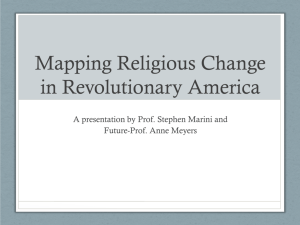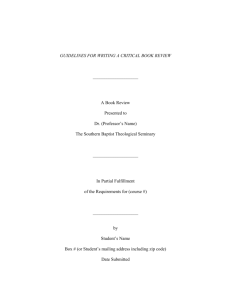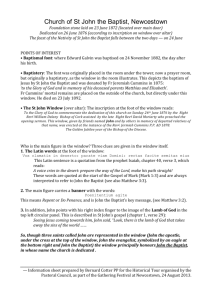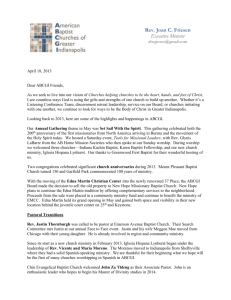Sheila Snoddy - Clemson University
advertisement
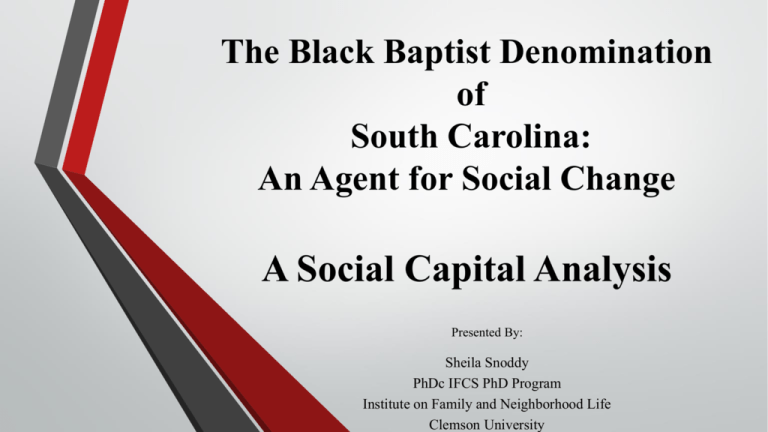
The Black Baptist Denomination of South Carolina: An Agent for Social Change A Social Capital Analysis Presented By: Sheila Snoddy PhDc IFCS PhD Program Institute on Family and Neighborhood Life Clemson University Introduction to the Study This study will utilize a quantitative approach for measuring the relationship and relative contributions of social capital to the creation of positive social change through the efforts of Black Baptist churches in South Carolina. This study will attempt to demonstrate how the Black church, through its use of social capital, mobilizes congregations for collective action in shaping civic discourse, bringing about social change and facilitating the development of vital communities. Statement of Problem Since the Civil Rights era, the Black church has been under attack for being powerless and nonchalant in stimulating and directing constructive social change. In spite of the many acclaimed abilities, resources, work, and reputation of the Black church and its development and use of social capital, it is becoming a prevalent sentiment within the American society that the Black church is an underutilized catalyst for facilitating positive social change, community building, and a thriving civil society. Purpose of the Study • • The purpose of this research is to systematically examine, within a social capital framework, how South Carolina’s Black Baptist denomination mobilizes its pastors and congregations for collective action in influencing civil society, impacting social change, and aiding in the development of vital and sustained individuals and communities. This study also pursues: • • • • to portray the current efforts of Black Baptist churches in South Carolina in creating and championing social change, to increase knowledge and opportunities to facilitate improvement and replication/expansion of social programs and services, and to promote and disseminate these positive efforts and practices among the Black Baptist denomination and well as the community-at-large. Lastly, the purpose of this study is to help formulate comprehensive, quantitative models and structured approaches to appropriately assess effects and to produce a systemic context for understanding social capital’s role in the Black Baptist church’s efforts to positively influence social change through the Black church. Definitions and Terms • • Social Capital: The connections among people, networks and organizations that can be drawn upon to solve problems positively, in most cases, to achieve the common good for all people. Indicators of social capital are: social engagement, collective efficacy, trust, social cohesion, reciprocity, social participation, and perception of community-level structures or characteristics (Putnam, 2000). Black Church: A religious entity that is inclusive of various Afrocentric cultural and historical practices, beliefs, influences, and theological orientations that is made up of a collective body of Christian churches (across denominational lines); of diverse physical and socioeconomic structures; with a shared identity; that meets primarily for worship; with accepted polity and doctrines; and that ministers and serves in various forms and degrees to predominately African-American people, to the communities in which African-Americans reside, and/or where the church building is located. Definitions and Terms • Community: People who develop the common recognition of collective interest, trust, cooperation, solidarity, and identity in a common cause and mutual action. • Social Change: The process by which social problems are addressed through the alteration in the nature of social institutions, social behavior, the social relations of a society, community of people, or other social structures. Theoretical Perspective Research increasingly indicates the significance of social capital as essential in the Black church’s efforts to develop and strengthen networks and to provide greater access to resources that are necessary to build community and influence social change. Social capital is postulated to be the key element in building communities. It is an enormous resource generated from people power. Significance of the Study • This study proves significant in contributing to the underdeveloped area of research associated with the relational impact of social capital in the Black church on its efforts to develop community and foster social change and in presenting pertinent questions and issues to guide future research. • The most paramount significance of this study lies in the fact that no existing studies have explored the establishment and mobilization of social capital in Black Baptist churches in SC in their individual and collective efforts to positively impact social change and community development. • Knowledge, understanding, and implications of social capital in the Black church may provide additional insight into the Black church’s perception of social capital, as well as its ability to utilize it effectively. Research Questions Research Question 1: What pastor and congregation characteristics predict Black Baptist churches’ of South Carolina engagement in social change? Research Question 2: How does the creation and utilization of social capital relate to establishing positive social change among the Black Baptist denomination? Research Question 3: Do high levels of social capital among Black Baptist churches predict engagement in social change activities? Hypotheses • Hypothesis 1 There are statistically significant differences in social change engagement among pastors and congregations. • Hypothesis 2 There is a significant positive relationship between social capital and social change. Social capital is positively related to the strengthening and the mobilizing of abilities and efforts of the Black church to influence social change. • Hypothesis 3 There are statically significant differences in the levels of social capital within Black Baptist churches in South Carolina. Review of Literature • Findings • Emerging Themes Methodology and Procedures • Research Design • Variables in the Quantitative Analysis • Target Population, Sample and Setting • Approach to Quantitative Analysis • Data Collection • Data Analysis Plan • Reliability and Validity • Limitations of the Study • • • • • • • • Self-report Bias Cross-sectional Design Data Collection Approach Non-probability Sampling Method of Convenience Sampling Incomplete Questionnaires Rate of Non-response error Weakened Statistical Power of Regression Analysis Research Bias Delimitations of the Study • No Mandatory Attendance for Pastors of Member Churches • One Perspective, That of the Pastor • Confined Only to Member Churches of the South Carolina Baptist Congress of Christian Education Preliminary Findings • Average Church Size is Less Than 200 Members • 85% of Participating Pastors are 60 Years of Age or Older • Majority of Churches have at least 3 Social Programs or Services That Serve the Community • 90% Reported Their Congregation Contributed Less Than $5000 Annually to These Social Programs and Services • Majority of Pastors Reported That They Have a Small Degree of Trust for National, State, and Local Government Officials • 95% Reported Their Congregation Feel Moderately Empowered to Make Positive Social Change in the Community Thank You For Your Attention!

